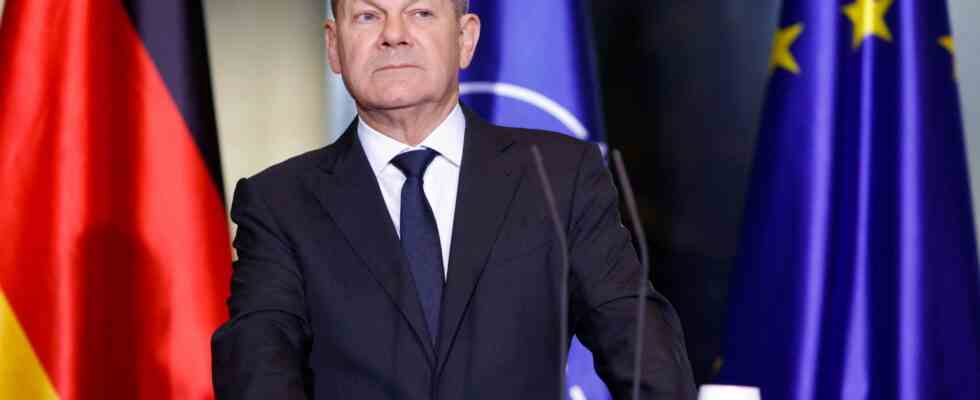Status: 05.12.2022 3:18 p.m
In a guest article for “Foreign Affairs”, the Chancellor settled accounts with Russia, which brought war to Europe and destroyed decades of “peace architecture”. Scholz also finds clear criticism for China and its political isolation.
In a guest article for the magazine “Foreign Affairs”, Chancellor Olaf Scholz commented on the current foreign policy situation – and in doing so, in addition to massive allegations against Russia, also made clear criticism of China.
With regard to the People’s Republic, the Federal Chancellor focused primarily on its growing economic role on the world market. In “the phase of globalization after the Cold War,” China had risen to become the “global player” that “it had been for long periods of time in world history,” wrote Scholz. But this gained importance offers neither “a justification for the isolation of Beijing nor for a restriction of cooperation.”
Scholz warned in his Guest article entitled “The global turning point” reiterated the importance of “open and fair trade”. But China is doing too little to achieve this goal – on the contrary, it has “clearly taken a path towards isolation and away from openness,” criticized the SPD politician.
Demand for “level playing field”
Scholz also addressed the topic of fair competition during his visit to Beijing a month ago. He now assured that Germany “in cooperation with its European partners” will continue to “demand equal competitive conditions for European and Chinese companies” in the future.
In terms of federal politics, the planned entry of the Chinese state-owned company Cosco in the port of Hamburg caused a fierce controversy. Contrary to the negative attitude of all line ministries, the Chancellery had endorsed China’s participation.
Respect for fundamental rights never internal affair
In addition to criticizing China’s trade policy, Scholz also expressed continued concern “about the growing insecurity in the South China Sea and in the Taiwan Strait” and about “China’s attitude to human rights and individual freedoms”. The Chancellor emphasised:
Respect for fundamental rights and freedoms can never be an ‘internal matter’ of a single state, since all Member States of the United Nations are committed to upholding these rights and freedoms.
With the outbreak of war, a “fundamentally new reality” began
However, Scholz clearly placed the central point of his guest contribution on the Russian invasion of Ukraine. The Chancellor again condemned the “brutal attack” in the strongest possible terms. It marks the “beginning of a fundamentally new reality” for him.
“Russia is using some of the most cruel military methods of the 20th century and is bringing unspeakable suffering to Ukraine,” emphasized Scholz, referring to the massive destruction in Ukrainian cities such as Mariupol, Irpin, Cherson and Isjum:
These places will forever remind the world of Russia’s crimes – and the perpetrators must be held accountable.
But with his decision to launch a war of aggression against Ukraine, Russian President Vladimir Putin also destroyed “a European and international peace architecture that had been built over decades.” Scholz warned:
In the manner of an imperial power, Russia is now attempting to forcibly shift borders and once again split the world into blocs and spheres of influence.
“Most fundamental principles of international law” broken
For Scholz, Russia’s transformation into a security threat is not only reflected in the war against Ukraine – it culminates in it. While Russia, with its “enormous resources,” still proved to be a “reliable supplier of energy and raw materials” during the Cold War, “authoritarian and imperialist efforts” had begun to revive since the 1990s.
Scholz recalled, among other things, Russia’s war against Georgia, but also the annexation of Crimea in 2014, which the West still sees as a breach of international law. “Step by step, Putin’s Russia embarked on a path that distanced the country ever further from Europe and from a peace order based on cooperation,” Scholz wrote. Now, with its war against Ukraine, Russia has once again broken the “most elementary” basic principles of international law enshrined in the United Nations Charter: “The renunciation of the use of force as a means of international politics and the obligation to respect independence, sovereignty and territorial integrity of all states”.
A “new role” for Germany
“The world must not allow Putin to get his way,” Scholz demanded, emphasizing Germany’s central role in Europe – as “one of the main guarantors” who must assume responsibility for security in Europe. “Germany’s new role requires a new strategic culture, and the national security strategy that we will adopt in a few months will take this into account,” said the Chancellor.
In the past three decades, questions about one’s own defense, especially the Bundeswehr, have been addressed “against the background of a peaceful Europe.” That has changed, according to Scholz:
Now we will be guided by the question of what threats we and our allies face in Europe, primarily from Russia. These include potential attacks on Alliance territory, cyberwarfare, and even the remote possibility of a nuclear attack, which Putin has unsubtly threatened.

